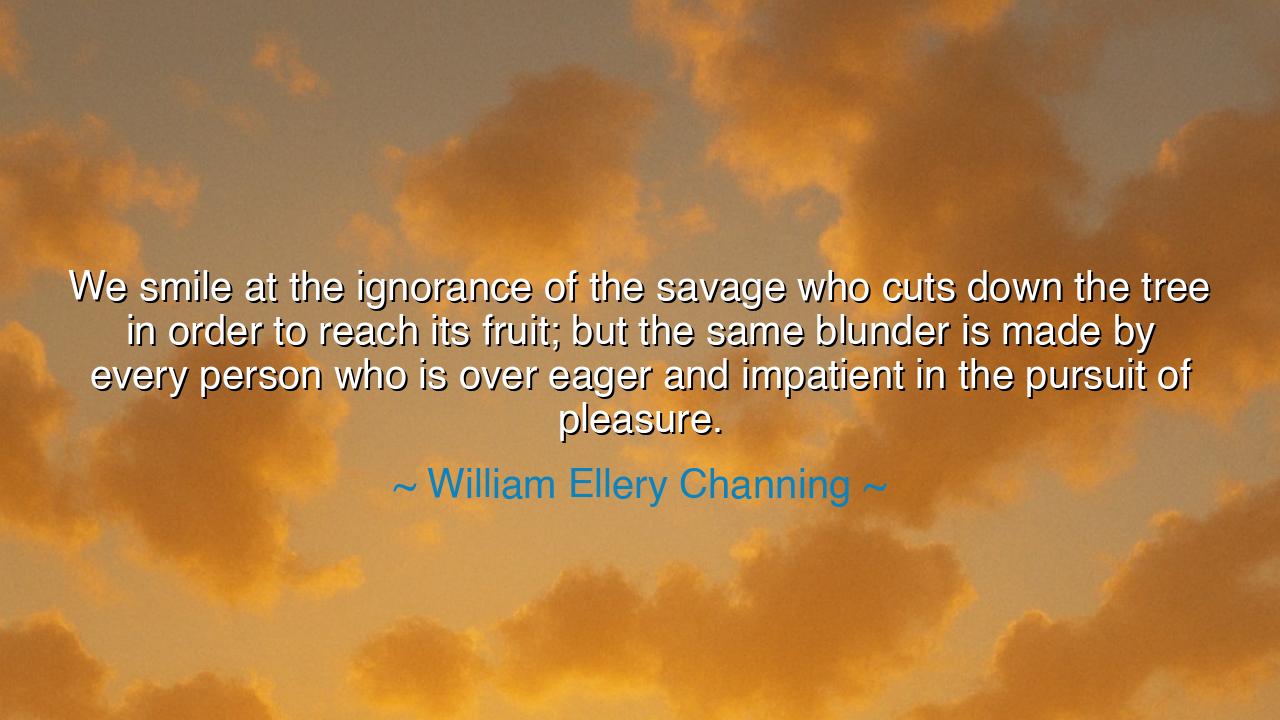
We smile at the ignorance of the savage who cuts down the tree in
We smile at the ignorance of the savage who cuts down the tree in order to reach its fruit; but the same blunder is made by every person who is over eager and impatient in the pursuit of pleasure.






Hear the words of William Ellery Channing, the great preacher and thinker of the 19th century: “We smile at the ignorance of the savage who cuts down the tree in order to reach its fruit; but the same blunder is made by every person who is over eager and impatient in the pursuit of pleasure.” At first glance, this may seem a rebuke of folly, but in truth, it is a teaching for all who rush blindly after desire. Channing does not mock only the primitive hand that destroys its source of nourishment; he warns that all humanity risks the same destruction when it seeks joy without wisdom.
The image is vivid: a tree, heavy with fruit, felled in a moment of hunger. The man who cuts it down gains for an instant, but loses forever the abundance it could have given. This is the way of impatience, the way of unchecked desire. It seeks what is easy, what is immediate, what is sweet in the moment—yet in its haste, it destroys the very root of enduring happiness. So too in life: those who sacrifice the long harvest of discipline, love, and virtue for the fleeting taste of indulgence awaken too late to barren ground.
The ancients spoke of this same truth. Recall the myth of Icarus, who, impatient for the heavens, flew too close to the sun. In his eagerness, he destroyed the wings that bore him, and he fell. He is but another who cut down the tree for the fruit. The lesson is eternal: impatience blinds us, and what seems victory in the moment becomes ruin in the years to come.
History offers yet more. Consider the empire of Rome, which once spanned the world. In its beginning, it was built on discipline, endurance, and sacrifice. But in its later days, it became drunk on luxury, seeking pleasure above duty, spectacle above service. The games grew larger, the banquets richer, the morals weaker. Like the man who cuts down the tree, Rome consumed the fruit of its greatness too quickly, and when the roots were gone, the empire withered.
Channing’s wisdom points us toward a higher way: the way of patience, of restraint, of reverence for the source of good things. To care for the tree is to receive its gifts season after season. To care for the soul is to reap joy, peace, and strength for all one’s days. To care for relationships, for family, for work, is to gather the harvest of love and purpose that no hasty indulgence can match.
The lesson is thus: do not destroy the source of joy by clutching too greedily at its fruit. Guard your body, lest pleasure today bring weakness tomorrow. Guard your heart, lest reckless passion burn away the love that could have endured a lifetime. Guard your spirit, lest impatience rob you of wisdom. True pleasure is not stolen in a moment—it is cultivated through faithfulness, discipline, and care.
So, beloved, make this your practice: when you see the fruit, rejoice, but honor the tree that bears it. Work with patience, cherish the sources of goodness in your life, and do not sacrifice tomorrow for the hunger of today. In this way, you will not only taste sweetness in the moment, but ensure a harvest that endures. And then, when the world tempts you to haste, you will remember Channing’s words, and instead of felling the tree, you will nurture it, and it will bless you all your days.






AAdministratorAdministrator
Welcome, honored guests. Please leave a comment, we will respond soon